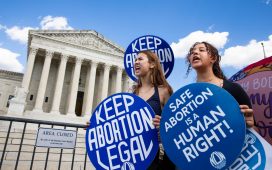Even Kamala Harris, who dedicated an entire interview to describing her support for trans people during her first run for president in 2019, and who otherwise has a strong record advocating for the queer community, has stopped short of giving a robust defense of trans rights in her campaign. When attacked for allowing incarcerated people to access gender-affirming care, she shot back that such care was offered in federal prisons under the Trump administration. Gender-affirming care “is a decision that doctors will make in terms of what is medically necessary,” Harris elaborated under further questioning by NBC anchor Hallie Jackson.
“It feels like that’s a long way from ‘we see you and we love you,’ which was your message to trans Americans in May,” Jackson pushed back. “What do you want the LGBTQ+ community to know as they’re looking for a full-throated backing from you for trans Americans?”
“I believe that all people should be treated with dignity and respect, period, and should not be vilified for who they are, and should not be bullied for who they are,” Harris replied.
To some queer and trans observers, Harris’ general rebuttal about a need for inclusion is a disappointment, failing to meet the intensity of the anti-trans backlash. Others see it as an appropriate calculation for a dangerous political moment. “There are attacks against multiple groups of people, and so a counter-message that says, ‘Targeting people is not good, we need to come together as a country, we need to be inclusive as a country’—that is an apt message for these times,” Pizer says.
The stakes of the rhetoric are extremely high. While the average American’s opinions about transgender policies—from bathroom bans to gender-affirming care restrictions—are largely unformed and in flux, according to research from the University of Minnesota, politicians’ anti-trans messages have broadened support for restrictive policies. “As public opinion continues to evolve in this area,” the researchers concluded, “much will depend on the behavior and framing offered by elites.”
And the anti-trans rhetoric from Trump and his allies has already had a profound impact on queer people—none more so than the trans women and drag queens featured in the ads without their consent. “I haven’t been able to sleep,” Gabrielle Ludwig, a trans woman whose college basketball career was exploited in multiple ads, told The Hill. “I don’t want my family affected. I have granddaughters, daughters who are in college. I only did this because I love to play basketball. That’s all it ever was.”
With so much ultimately being up to the courts—and political battles sure to continue in the states, if not the federal government—Braverman believes a Harris win could be a chance to change the narrative. “The demonization and the discussion and the ‘let’s just debate people’s humanity’—that is the thing that is really making life hard for people,” they say.
Harris cannot unilaterally reverse the tide of anti-trans legislation in states; beyond her ability to affect policy areas like health and education, her greatest power lies in her words. “Laws and regulations are really important,” Braverman says, but “there needs to be more. There needs to be education, there needs to be understanding. There needs to be support from people in power.”
Get the best of what’s queer. Sign up for them.’s weekly newsletter here.








